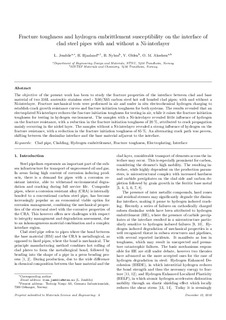Fracture toughness and hydrogen embrittlement susceptibility on the interface of clad steel pipes with and without a Ni-interlayer
Journal article
Submitted version
Permanent lenke
http://hdl.handle.net/11250/2498096Utgivelsesdato
2017Metadata
Vis full innførselSamlinger
Sammendrag
The objective of the present work has been to study the fracture properties of the interface between clad and base material of two 316 L austenitic stainless steel - X60/X65 carbon steel hot roll bonded clad pipes; with and without a Ni-interlayer. Fracture mechanical tests were performed in air and under in situ electrochemical hydrogen charging to establish crack growth resistance curves and fracture initiation toughness for both systems. The results revealed that an electroplated Ni-interlayer reduces the fracture initiation toughness for testing in air, while it raises the fracture initiation toughness for testing in hydrogen environment. The samples with a Ni-interlayer revealed little influence of hydrogen on the fracture resistance, with a reduction in the fracture initiation toughness of 20%, attributed to crack propagation mainly occurring in the nickel layer. The samples without a Ni-interlayer revealed a strong influence of hydrogen on the fracture resistance, with a reduction in the fracture initiation toughness of 85%. An alternating crack path was proven, shifting between the dissimilar interface and the base material adjacent to the interface.
